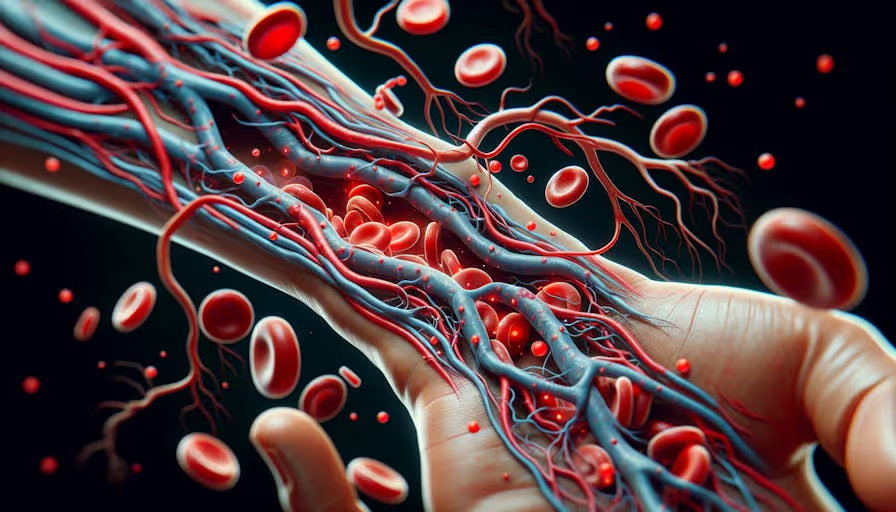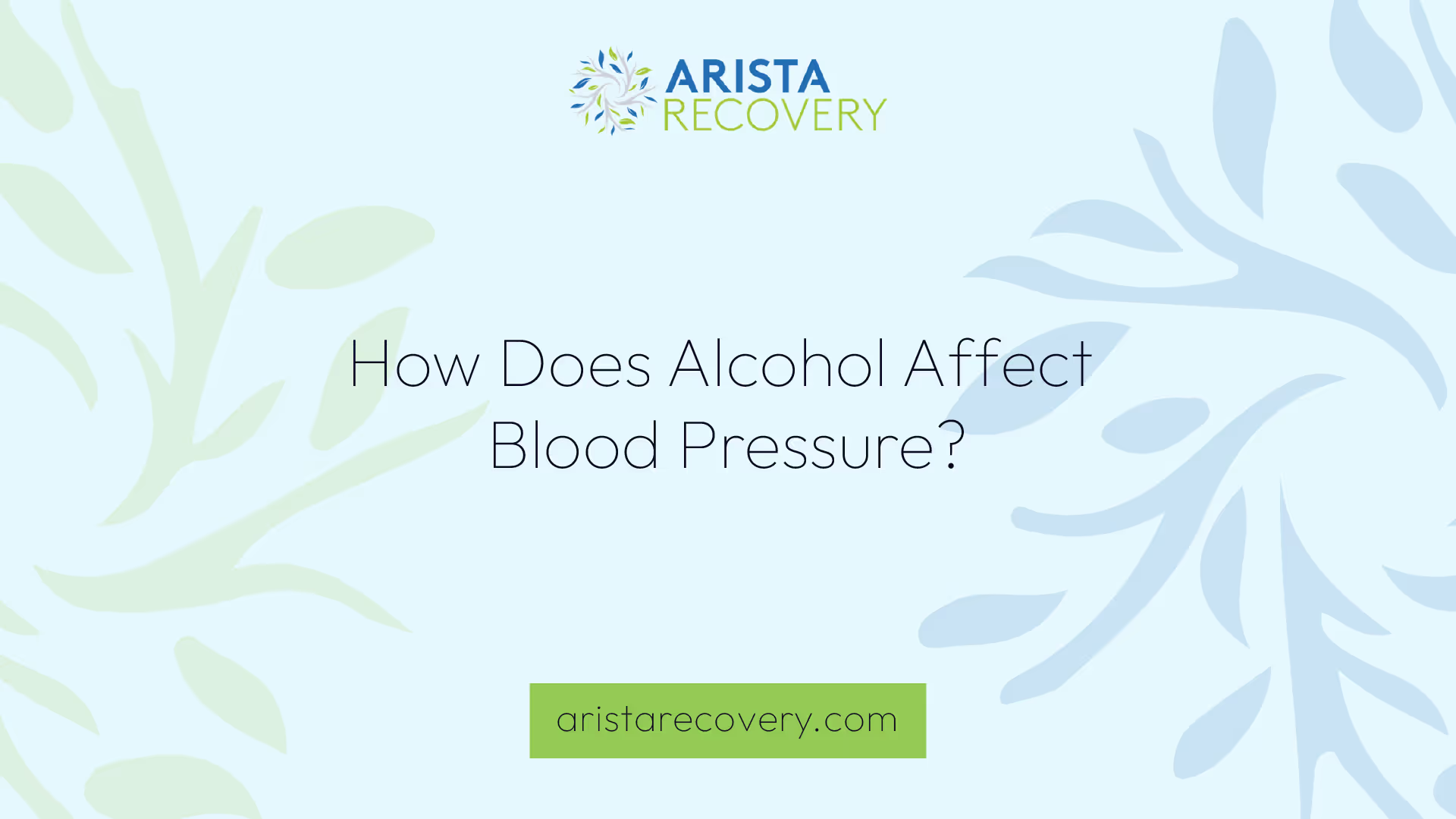How Does Alcohol Affect Blood Pressure?

Understanding Alcohol and Blood Pressure
The relationship between alcohol and blood pressure is multifaceted and can be influenced by factors such as consumption levels and individual health status. Understanding the effects of alcohol on blood pressure is key to maintaining one's overall health and well-being.

Defining Moderate Alcohol Consumption
Moderate alcohol consumption is defined differently for men and women. For healthy adults, according to the Mayo Clinic, moderate alcohol consumption means up to one drink a day for women of all ages and men older than age 65, and up to two drinks a day for men age 65 and younger. One drink is typically categorized as 12 ounces of beer or 5 ounces of wine.
While moderate drinking may lower the risk of heart disease and decrease blood pressure by about 4mm Hg, the Mayo Clinic also emphasizes that if health is a primary concern, it would be healthier to abstain from alcohol altogether.
The Impact of Heavy Drinking
While moderate alcohol consumption might have some potential health benefits, heavy drinking can have deleterious effects on blood pressure. The HSE asserts that excessive alcohol consumption can affect the muscles in your blood vessels, causing them to narrow and subsequently leading to high blood pressure, also known as hypertension. This is the most common health issue related to alcohol consumption.
The risk of developing hypertension increases with the amount of alcohol consumed, especially in individuals over the age of 35. Even one drink a day can elevate the risk. Therefore, while it's important to note that moderate alcohol consumption might have potential health benefits, it's equally vital to understand that heavy drinking can have adverse effects on blood pressure and overall health.
How Alcohol Affects Blood Pressure
Understanding the effects of alcohol on blood pressure is essential as it can significantly impact an individual's health. These effects can range from short-term changes to long-term health complications depending on the amount of alcohol consumed.
Short-Term Effects of Alcohol
In the short term, moderate drinking, defined as up to one drink a day for women of all ages and men older than age 65, and up to two drinks a day for men age 65 and younger, might lower your blood pressure by about 4 mm Hg according to the Mayo Clinic. However, binge drinking, consuming four or more drinks a day for men and three or more drinks daily for women, can significantly impact blood pressure readings. Even one episode of binge drinking can lead to a substantial rise in blood pressure.
Long-Term Impacts of Alcohol Consumption
On the other hand, chronic heavy drinking can lead to a host of health problems, including high blood pressure, cardiovascular diseases, liver disease, and certain cancers. Consuming a lot of alcohol can affect the muscles in the blood vessels, causing them to narrow and lead to hypertension, the most common alcohol-related health problem. The risk of developing hypertension increases with the amount of alcohol consumed, especially for individuals over the age of 35. Even one drink a day can increase the risk.
Chronic heavy drinking can also lead to cardiomyopathy, a condition that weakens the heart muscles and hinders the efficient pumping of blood throughout the body, potentially damaging organs and tissues due to insufficient blood flow. This can result in various complications, including strokes.
Moreover, excessive alcohol consumption over time can influence heart rate, causing it to beat too quickly or irregularly, resulting in heart rhythm problems known as arrhythmias [1].
The American Heart Association also warns that excessive alcohol can raise the levels of some fats in the blood, which can lead to significant health problems like high blood pressure, heart failure, and stroke.
In conclusion, the effects of alcohol on blood pressure can be severe, particularly when consumed in large quantities over a prolonged period. It is crucial to manage alcohol consumption and adhere to recommended guidelines for intake to maintain healthy blood pressure levels and reduce the risk of hypertension and other associated health complications.
Risks Associated with Alcohol and Hypertension
While moderate alcohol consumption might not dramatically impact the overall health of an individual, heavy drinking indeed has substantial health implications, including its effects on blood pressure.
Alcohol's Role in Hypertension Development
Heavy drinking can cause a significant rise in blood pressure levels, leading to hypertension. Alcohol affects the muscles in your blood vessels, causing them to become narrower. This narrowing can result in high blood pressure, which is the most common alcohol-related health problem.
It is important to note that the more alcohol consumed, the higher the risk of developing hypertension, especially for individuals over the age of 35. Just one drink a day can elevate the risk, which underlines the importance of moderation in alcohol consumption.
Other Health Risks Linked to Alcohol
In addition to hypertension, heavy drinking can lead to serious health problems such as heart failure, stroke, and irregular heartbeat [2].
Additionally, chronic heavy drinking can bring about various cardiovascular diseases, including high blood pressure, along with other health complications like liver disease and certain cancers [2].
These health risks underline the importance of drinking alcohol in moderation to maintain optimal blood pressure levels and overall health [2].
How Alcohol Interacts with Heart Rate
Understanding the effects of alcohol on heart rate is crucial when discussing the broader topic of the impact of alcohol on blood pressure. This section explores both the immediate and long-term effects of alcohol consumption on heart rate.
Alcohol's Immediate Impact on Heart Rate
Research shows that alcohol consistently increases heart rate at all times within 24 hours of consumption [3]. During this period, various levels of alcohol consumption can result in different degrees of heart rate increase and blood pressure decrease.
Data courtesy (PubMed)
As evident from the table, both high and medium doses of alcohol consumption can lead to a decrease in blood pressure and an increase in heart rate shortly after consumption. Even low-dose alcohol has been found to raise heart rate, although it doesn't appear to affect blood pressure within six hours of intake.
Long-Term Effects on Heart Rate
The long-term impacts of alcohol on heart rate are less well-studied, but it's clear that habitual heavy drinking can lead to sustained increases in heart rate, among other cardiovascular issues. This can contribute to a higher risk of hypertension, heart disease, and other health problems.
While occasional moderate drinking might not significantly affect heart rate in the long term, the consistent heavy consumption of alcohol can lead to a condition known as 'holiday heart syndrome.' This syndrome is characterized by irregular heart rhythms, often experienced after bouts of heavy drinking.
In conclusion, while alcohol can cause an immediate increase in heart rate, its long-term effects on heart rate and overall cardiovascular health can be more severe, particularly with heavy consumption. Therefore, understanding these effects is vital in managing the risks associated with alcohol consumption and maintaining healthy blood pressure levels.
The Role of Alcohol in Cardiovascular Health
Alcohol's impact on cardiovascular health is a topic of extensive research and discussion in medical communities. It is widely acknowledged that alcohol has a complex relationship with blood pressure and cardiovascular diseases.
Alcohol and Cardiovascular Diseases
Moderate alcohol consumption may help lower the risk of heart disease. The Mayo Clinic defines moderate alcohol consumption as up to one drink a day for women of all ages and men older than age 65, and up to two drinks a day for men age 65 and younger. Examples of one drink include 12 ounces of beer or 5 ounces of wine.
In this context, moderate drinking may lower your blood pressure by about 4 mm Hg. However, it is crucial to note that drinking a lot of alcohol can affect the muscles in your blood vessels, causing them to become narrower. This can lead to high blood pressure or hypertension, the most common alcohol-related health problem. The more alcohol consumed, the higher the risk of developing hypertension, especially for individuals over the age of 35. Just one drink a day can increase the risk [1].
Furthermore, consuming too much alcohol can raise the levels of some fats in the blood, leading to significant health problems like high blood pressure, heart failure, and stroke.
Alcohol's Impact on Weight Gain
Alcohol's impact on weight gain is another important aspect of its effects on blood pressure. Drinking alcohol, with its empty calories, can contribute to weight gain, a significant risk factor for high blood pressure.
This is especially relevant as hypertension is one of the most preventable alcohol-related problems, and reducing alcohol consumption can lower blood pressure, thus reducing the risk of hypertension. Moreover, reducing alcohol intake can also aid in weight loss, which is beneficial for overall heart health [1].
To regulate blood pressure, men should not have more than two drinks per day, and women should have no more than one drink per day. However, if you have high blood pressure, it's essential to be cautious as alcohol can interfere with blood pressure medications.
In conclusion, while moderate alcohol consumption might have some benefits for cardiovascular health, the risks associated with excessive drinking, including hypertension and weight gain, are significant. Therefore, it is vital to manage alcohol consumption carefully to maintain healthy blood pressure levels and overall cardiovascular health.
Managing Alcohol Consumption for Blood Pressure
Understanding the effects of alcohol on blood pressure is crucial for maintaining heart health. This involves adhering to guidelines for healthy alcohol intake and recognizing the importance of moderation.
Guidelines for Healthy Alcohol Intake
According to the Mayo Clinic, moderate alcohol consumption can potentially lower the risk of heart disease. For healthy adults, this means:
- Up to one drink a day for women of all ages and men older than age 65.
- Up to two drinks a day for men age 65 and younger.
Here, one drink is defined as 12 ounces of beer or 5 ounces of wine. Limiting alcohol intake is generally beneficial, as it contributes significantly to increases in blood pressure [5].
The Importance of Moderation
While moderate alcohol consumption may have certain health benefits, it's important to note that alcohol can also be harmful. Drinking beyond the recommended limits can lead to a number of health issues, including an increase in blood pressure.
The American Heart Association advises that men should not have more than two drinks per day, and women should not have more than one drink per day to help regulate blood pressure. Alcohol can interfere with blood pressure medications, making it especially crucial for individuals with high blood pressure to be cautious.
Moreover, alcohol contains empty calories, which can contribute to weight gain, a significant risk factor for high blood pressure [4]. Therefore, even if you're drinking within the recommended limits, it's important to monitor your overall calorie intake to maintain a healthy weight.
In conclusion, while moderate drinking can have potential health benefits, the key to managing the effects of alcohol on blood pressure lies in moderation and mindful consumption. It's always a good idea to consult with a healthcare professional if you have any concerns about your alcohol consumption and its potential impact on your blood pressure.
References
[1]: https://www2.hse.ie/living-well/alcohol/health/effects-on-your-body/blood-pressure/
[2]: https://www.mayoclinic.org/diseases-conditions/high-blood-pressure/expert-answers/blood-pressure/faq-20058254
[3]: https://www.ncbi.nlm.nih.gov/pmc/articles/PMC8130994/
[4]: https://www.heart.org/en/health-topics/high-blood-pressure/changes-you-can-make-to-manage-high-blood-pressure/limiting-alcohol-to-manage-high-blood-pressure
[5]: https://newsroom.heart.org/news/routinely-drinking-alcohol-may-raise-blood-pressure-even-in-adults-without-hypertension
You’re not alone in this.
When mental health challenges and addiction intersect, it can feel isolating. At Arista, we offer compassionate, evidence-based, and trauma-informed care to help you heal, grow, and move forward.
You’re not alone in this.
When mental health challenges and addiction intersect, it can feel isolating. At Arista, we offer compassionate, evidence-based, and trauma-informed care to help you heal, grow, and move forward.
Support that moves with you.
You’ve taken a brave first step. At Arista Recovery, we’re here to help you continue with best-in-class care designed for long-term healing and support.
.webp)






